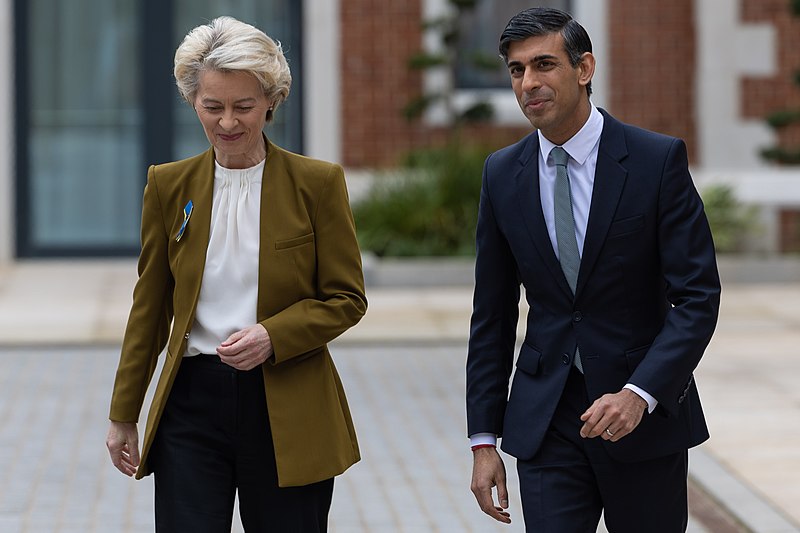April marks the anniversary of the historic 1998 Good Friday Agreement that largely ended decades of sectarian violence in Northern Ireland. Some of those who played a role in brokering the peace deal said that they hope the landmark agreement would help find a solution to the region’s political crisis.
In an interview with Reuters, former British Prime Minister Tony Blair, one of the architects of the deal, expressed optimism that progress could still be made while sticking to the peace deal, as the region’s devolved assembly in Stormont currently remains due to the boycott of its largest pro-British Democratic Unionist Party due to the post-Brexit trade rules between the United Kingdom and the European Union. Some have expressed fears that the DUP’s current boycott may result in tremendous consequences for the region.
The UK’s departure from the EU has also apparently upset some of the balance of the deal, such as the principle of cross-community consent as a requirement for major legislation to have the support of the majority of nationalists and unionists in the assembly.
Nationalists in Northern Ireland have argued that the region was taken from the EU in a UK-wide vote even though its region voted 56-44 to remain within the bloc. Unionists, who backed the departure, said the trade barriers with the rest of the UK to avoid a hard land border with EU-member Ireland were made without their consent.
In February, the UK and the EU struck a new post-Brexit deal for the region, known as the Windsor Framework, with its Stormont Brake winning the backing of the British Parliament. However, the DUP has said it will continue its boycott until major changes are made to the agreement, with one DUP lawmaker saying that the Windsor Framework effectively scrapped the 1998 peace deal.
Last week, the region’s Orange Order also voted to oppose any return to the devolved assembly unless major revisions are made to the agreement but noted that they welcomed the brokering of the Windsor Framework, formerly known as the Northern Ireland Protocol.
“The Windsor Framework has delivered some limited, but welcome practical adjustments to the existing protocol. However, it does not resolve the fundamental concerns,” said the Orange Order in a statement, citing that aspects of the new deal were “oversold,” and that the deal “continues to treat Northern Ireland as a place apart within the United Kingdom and equal citizenship has not been restored.”



 Trump Allows Commercial Fishing in Protected New England Waters
Trump Allows Commercial Fishing in Protected New England Waters  Jack Lang Resigns as Head of Arab World Institute Amid Epstein Controversy
Jack Lang Resigns as Head of Arab World Institute Amid Epstein Controversy  Japan Election 2026: Sanae Takaichi Poised for Landslide Win Despite Record Snowfall
Japan Election 2026: Sanae Takaichi Poised for Landslide Win Despite Record Snowfall  Trump Backs Nexstar–Tegna Merger Amid Shifting U.S. Media Landscape
Trump Backs Nexstar–Tegna Merger Amid Shifting U.S. Media Landscape  Federal Judge Restores Funding for Gateway Rail Tunnel Project
Federal Judge Restores Funding for Gateway Rail Tunnel Project  TrumpRx Website Launches to Offer Discounted Prescription Drugs for Cash-Paying Americans
TrumpRx Website Launches to Offer Discounted Prescription Drugs for Cash-Paying Americans  Trump Lifts 25% Tariff on Indian Goods in Strategic U.S.–India Trade and Energy Deal
Trump Lifts 25% Tariff on Indian Goods in Strategic U.S.–India Trade and Energy Deal  Pentagon Ends Military Education Programs With Harvard University
Pentagon Ends Military Education Programs With Harvard University  India–U.S. Interim Trade Pact Cuts Auto Tariffs but Leaves Tesla Out
India–U.S. Interim Trade Pact Cuts Auto Tariffs but Leaves Tesla Out  Trump Says “Very Good Talks” Underway on Russia-Ukraine War as Peace Efforts Continue
Trump Says “Very Good Talks” Underway on Russia-Ukraine War as Peace Efforts Continue  US Pushes Ukraine-Russia Peace Talks Before Summer Amid Escalating Attacks
US Pushes Ukraine-Russia Peace Talks Before Summer Amid Escalating Attacks  U.S. Announces Additional $6 Million in Humanitarian Aid to Cuba Amid Oil Sanctions and Fuel Shortages
U.S. Announces Additional $6 Million in Humanitarian Aid to Cuba Amid Oil Sanctions and Fuel Shortages  Iran–U.S. Nuclear Talks in Oman Face Major Hurdles Amid Rising Regional Tensions
Iran–U.S. Nuclear Talks in Oman Face Major Hurdles Amid Rising Regional Tensions  Trump Signs Executive Order Threatening 25% Tariffs on Countries Trading With Iran
Trump Signs Executive Order Threatening 25% Tariffs on Countries Trading With Iran  Trump’s Inflation Claims Clash With Voters’ Cost-of-Living Reality
Trump’s Inflation Claims Clash With Voters’ Cost-of-Living Reality  U.S. Lawmakers to Review Unredacted Jeffrey Epstein DOJ Files Starting Monday
U.S. Lawmakers to Review Unredacted Jeffrey Epstein DOJ Files Starting Monday 































